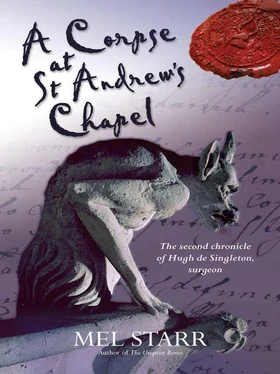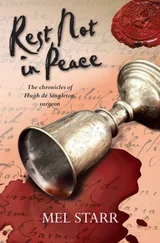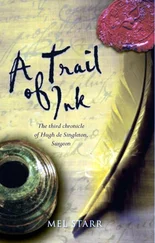Mel Starr - A Corpse at St Andrew's Chapel
Здесь есть возможность читать онлайн «Mel Starr - A Corpse at St Andrew's Chapel» весь текст электронной книги совершенно бесплатно (целиком полную версию без сокращений). В некоторых случаях можно слушать аудио, скачать через торрент в формате fb2 и присутствует краткое содержание. Год выпуска: 2010, Издательство: Kregel Publications, Жанр: Исторический детектив, на английском языке. Описание произведения, (предисловие) а так же отзывы посетителей доступны на портале библиотеки ЛибКат.
- Название:A Corpse at St Andrew's Chapel
- Автор:
- Издательство:Kregel Publications
- Жанр:
- Год:2010
- ISBN:нет данных
- Рейтинг книги:5 / 5. Голосов: 1
-
Избранное:Добавить в избранное
- Отзывы:
-
Ваша оценка:
- 100
- 1
- 2
- 3
- 4
- 5
A Corpse at St Andrew's Chapel: краткое содержание, описание и аннотация
Предлагаем к чтению аннотацию, описание, краткое содержание или предисловие (зависит от того, что написал сам автор книги «A Corpse at St Andrew's Chapel»). Если вы не нашли необходимую информацию о книге — напишите в комментариях, мы постараемся отыскать её.
A Corpse at St Andrew's Chapel — читать онлайн бесплатно полную книгу (весь текст) целиком
Ниже представлен текст книги, разбитый по страницам. Система сохранения места последней прочитанной страницы, позволяет с удобством читать онлайн бесплатно книгу «A Corpse at St Andrew's Chapel», без необходимости каждый раз заново искать на чём Вы остановились. Поставьте закладку, и сможете в любой момент перейти на страницу, на которой закончили чтение.
Интервал:
Закладка:
I followed the trail through the wood, but not easily. I lost it several times and only found the path again by circling the last upturned leaves I had found. My search was made some easier because the nocturnal hiker I trailed had gone unfailingly west in a course which only gradually, after nearly half a mile, began to curve north. An hour later the track led me to the road to Alvescot, less than a mile from the village.
I stopped often while I followed the path through the forest, but heard no struggling animal nor saw any snare. Whoever had used this way through the wood wished only to be through to the other side. He had no other business which brought him here. And he had not been through the wood by this path often, for his route was not well trodden, but on the contrary, seemed used but rarely.
I could see no reason to return to Bampton through the forest. And there was no point in walking on to Alvescot. I was sure that whoso made the track I had followed through the wood was the same man who had traveled Mill Street toward Alvescot five days before. And likely was the same man who had bashed my head at the Alvescot churchyard.
If my quarry was a poacher, he did his work somewhere beyond Alvescot. The man had passed many likely places to set snares. Perhaps he had done so, and laid them so cleverly that I did not find them. But I did not think this could be so. Why set snares about a marsh, then continue through the forest to the road? It seemed to me a poacher would set his traps, then return through the wood the way he had come. No, this fellow had business elsewhere, be it poaching, or, as I was beginning to suspect, some other pursuit in mind.
Lord Gilbert’s forest lay within my bailiwick, but was no responsibility of John Prudhomme’s. I resolved to investigate the woodland path and he who trod upon it on my own. I did not wish any other to know what I was about, for fear that gossip might make my work known and my prey cautious. More cautious than he was already. A man would not forsake a road for a forest track in the dark of night was he not already alert and wary.
A large old beech stood over the road near the place where the path joined the road to Alvescot. I marked it so I might find the place on a dark night, then made my way back to Bampton in time for my supper. Unobserved, so far as I knew, but for Emma atte Bridge.
Wilfred was not known for loquacity but I did not want even the porter to know that I left the castle this night. A man will not tell what he does not know. A length of rope over the castle wall had served well. I resolved to use the method again.
When the castle was dark and quiet I stole to the marshalsea for rope, then silently mounted the steps to the parapet. There would be little moon this night, and that would not rise ’til near dawn. The north wall would be especially dark this night. My grey chauces and brown cotehardie would be invisible even if any who spent the night at the Ladywell chose that moment to awaken and examine the castle.
I knotted the rope every foot or so to aid my return, tied one end to a merlon, and tossed the other end to the ground. Moments later my feet also found the thin grass at the base of the north wall.
As there was yet no moon above the town rooftops, I saw no need to stumble my way across field and meadow to the forest. I could barely see Mill Street myself when I stood upon it at the southwest corner of the castle. No man, even if he knew I walked the road, could see me more than ten paces away. Of course, if another man traveled the road I should not see him, either. I walked silently, stopping every few paces to listen. My ears are good. Perhaps, if another man chose to be about on the road this night, I might hear him before he heard me. I wished I had remembered to bring with me the club, just in case.
The road through the forest was so dark I occasionally lost my way and stumbled against foliage growing at the verge. I was sure no man would attempt the wooded path I had found on such a night. Not until the waning moon rose to add some light to the tenebrous thickets near the bog.
Stars provided my only light. It was barely enough to locate the great beech I marked to fix the place where the forest path found the road. I settled myself into a cleft between two large roots. This location faced the road and its junction with the path. The seat had but one flaw. ’Twas too comfortable. I had no trouble staying awake when seated on a stump. But now I found myself drifting to sleep. Only when my nodding head with its symmetrical lumps met the smooth bark of the tree was I jolted awake.
This occurred several times before the thin light of a crescent moon brought some feeble illumination to the road which stretched across my sight. The soil of the road was lighter in color than the forest around it. A man walking upon it would produce a shadow against the lighter background. A shadow which would move. In the northeast, a predawn glow added to the light to illuminate the road.
If a man chose to walk this night the forest path I had found, I thought it reasonable to expect that he would wait until the moon could light his way. I found no difficulty in remaining alert for the remainder of the night, for I expected a poacher to step from the forest to the road at any moment. But no shadow moved past me on the way. The eastern sky grew light through the entwined branches of the trees when I finally rose from my seat, stretched, brushed off my chauces, and set off for the castle. The night was a failure.
The pale golden glow in the eastern sky lighted my way through the wood and across the meadowland west of town and castle. Where the road left the forest a gentle breeze caused me to shiver on my way. I had become stiff with cold, sitting at the base of the beech, but there had been no wind there in the forest to compound my discomfort.
I was near the castle wall when the gentle morning wind brought to my nose the welcome smell of roasting meat. It was early for the cook to be at his work in the castle kitchen, and he would not yet be roasting meat for the castle dinner. He would first be about baking loaves for the day when he did rise from his bed. But I smelled meat, not bread. And the breeze blew wrong to bring the scent of roasting meat to me from the castle kitchen. The wind came from the southeast; from the huts in the Weald.
It was my goal to climb the rope I had left tied to the merlon in the north-wall parapet before men rose to greet the new day. But this new scent asked too many questions which needed answers. I determined to seek them quickly, before daylight would make visible my climb up the castle wall.
I walked swiftly from Mill Street down the lane toward the Weald huts. In the twilight of early dawn I saw smoke from the eve vents of two huts, those of Thomas atte Bridge and the widow Emma. The inhabitants of these two dwellings were about their business early, and I knew why.
Few others in the Weald or elsewhere would have meat to roast in June. The flesh from autumn’s slaughtered hog or goat was long since consumed in most men’s homes. These two houses wished to roast their meat when no other would take note. I was convinced again I dealt with a poacher, and now knew who the man was. Although why Thomas atte Bridge would share with his sister-in-law I did not know. In truth, the question did not then occur to me.
I hurried back to Mill Street, hastened to the castle and climbed my rope ladder as the morning sun illuminated the cross atop the spire of St Beornwald’s Church. From atop the wall I saw an old man praying at the Ladywell. His back was to me. I drew the rope from around the merlon, tucked it beneath my cotehardie, and stole down the parapet steps and across the inner yard to the great hall and my chamber.
Wisps of smoke from the kitchen chimney told me that the cook was risen from his bed and at his work. But he and his assistant were busy with oven and loaves. No face appeared at the kitchen door to observe my return.
Читать дальшеИнтервал:
Закладка:
Похожие книги на «A Corpse at St Andrew's Chapel»
Представляем Вашему вниманию похожие книги на «A Corpse at St Andrew's Chapel» списком для выбора. Мы отобрали схожую по названию и смыслу литературу в надежде предоставить читателям больше вариантов отыскать новые, интересные, ещё непрочитанные произведения.
Обсуждение, отзывы о книге «A Corpse at St Andrew's Chapel» и просто собственные мнения читателей. Оставьте ваши комментарии, напишите, что Вы думаете о произведении, его смысле или главных героях. Укажите что конкретно понравилось, а что нет, и почему Вы так считаете.












